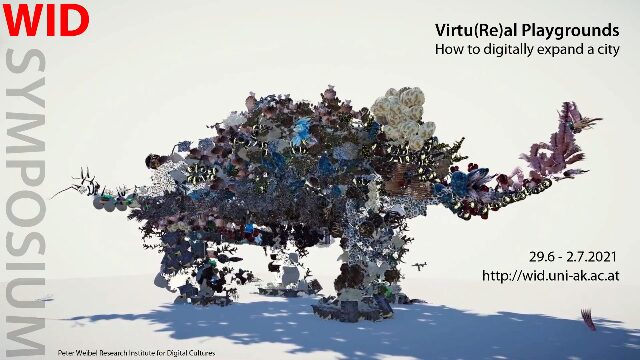Virtu(real) Playgrounds
- How to Digitally Expand a City
Veranstalter*innen
Datum
- 30. Juni 2021–02. Juli 2021 Universität für angewandte Kunst in Wien, Wien, Österreich, Online
Schlagwörter
Virtual Reality (VR), Stadtforschung, Posthumanism, Lehr- und Lernforschung, Digitale Kunst, Digital Humanities
text
Gaming, Playing, Learning. Interrelations of Creativity and the Virtual Space The distraction and disruptures in attention induced by mass media and further enhanced by social media has become an omnipresent part of our everyday lives. Remote/Digital technologies seem to shape people´s spatial behaviour more than architectural elements themselves. Even our urban tissue has become a metaverse, driven by chronic hyper-efficiency, simultaneity and equanimity. The occurrence of counteractive behavioural measures such as “cocooning” is the result of an environment perceived as disturbing, unfriendly or even dangerous. If we understand such practices as a direct reaction to the increasing lack of playfulness in virtual spaces, we need to ask: how can we pursue unpredictability and indeterminacy into the digital realm? Our environments shall desirably enhance free open space, anonymous urban gaps, random undulating landscapes, which can convey a sense of freedom through unexpected vastness. If we think about the future city, the task arises to leave this newly created urban virtuality blank, at least to some extent. Doesinger points out that digital interactivity is reducing creativity as it is profoundly regulated, as evolved mainly through video-games and their technical limitations. It seems that this absence of a protocol is also what conceptually differentiates the action of playing and gaming: playing implies invention and learning, while gaming is about performing preconceived rules. Playfulness is therefore understood as an lively intra-action, where the action and the actor are reciprocally construing each other. This Symposium aims to discuss how media pushed our cities into an expanded field and, on the other hand, how urban space could be liberated through playful virtuality. This means to negotiate the advance of data-driven automatic controls into increasing(ly intimate) areas of (personal) life and as well addressing the conflict between efficiency and optimization versus personal and collective freedom of decision. In BYOB, Rafaël Rozendaal showed how to bring the internet to a real life physical space. During the event, a community emerged spontaneously and joyfully, occupying the urban space with self-determined media projections. Underground City XXI is an early investigation by the viennese group nomad.theatre in virtual urban space: different physical simulations of an urban situation were fed into an emerging digital sculpture. According to Martijn de Waal, digital media may enable a new definition of the urban public sphere, reinvigorating the classical ideal of the city as an open, democratic “community of strangers”. Hito Steyerl points out, that social media and cell-phone cameras have created a zone of mutual mass-surveillance, which adds to the ubiquitous urban networks of control. Also, as Vilém Flussers propose “Perhaps we are about to remember again the forgotten celebrating. Perhaps we are about to find our way back through the strange detour through telematics to “authentic” being human, which is to say, to celebratory existence for the other, to purposeless play with others and for others.” Do we still have the possibility of a collective virtual and material space, a shared experience, settled in built and unbuilt space alike, both beneficially interwoven into each other?
Vortragende

Orte
Adressen
- Universität für angewandte Kunst in Wien, Wien, Österreich
- Oskar-Kokoschka-Platz 2
- 1010 Wien
- Österreich
- Online
Mediendateien
 Bild#1
Bild#1